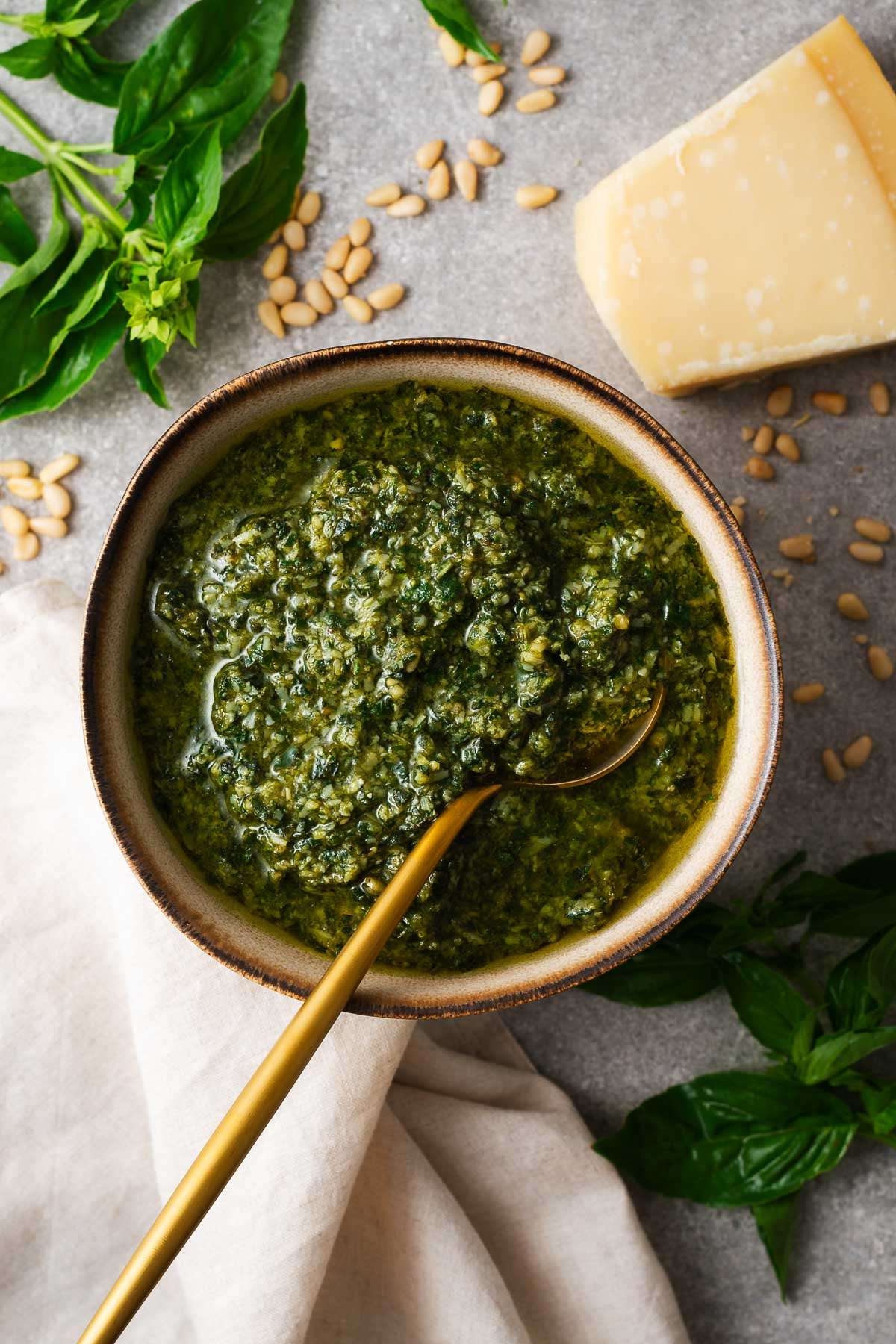
5.0 from 3 votes
Large Batch Food Processor Pesto
This easy large-batch basil pesto recipe uses Samin Nosrat's method to make traditional Ligurian pesto the easiest way. Samin's secret for the best homemade food processor pesto is to not overblend the fresh basil leaves. So, you need to get the garlic and nuts smooth before you process the basil.
Prep Time
15 mins
Total Time
15 mins
Servings: 16
Calories: 145 kcal
Course:
Condiments
Cuisine:
Mediterranean , Italian
Ingredients
- 1 garlic clove , roughly chopped
- ½ teaspoon coarse salt
- ½ cup pine nuts , lightly toasted*
- ¾ cup extra virgin olive oil , divided, more as needed
- 2 cups packed fresh basil leaves
- 3 ½ oz finely grated Parmigiano Reggiano (parmesan cheese) , about 2 loosely packed cups
- kosher salt , to taste
Instructions
- Place the roughly chopped garlic clove in a mortar with the ½ teaspoon of coarse salt. Grind the garlic into a paste. Then add the toasted pine nuts one tablespoon at a time. Bash each tablespoon until you have a creamy paste before adding the next. Set aside. (See the notes if you prefer to do this step in the food processor.)
- Use a sharp knife to slice the basil leaves into strips (to make them break down quicker in the food processor). Put the sliced basil into the food processor bowl and drizzle over half of the olive oil. Then pulse, stopping to push down the leaves with a spatula a few times until you have a fragrant, deep-green basil paste – about 2 minutes.
- Transfer the basil paste to a bowl with the remaining olive oil, and add the salty garlic and pine nut paste. Mix well to combine into a creamy paste. Stir in the parmesan cheese.
- Taste and adjust the salt – I add ¼ teaspoon of kosher salt. Let the mixture sit for a few minutes, then taste and adjust again, if needed. Add more olive oil until you have your preferred pesto consistency – I typically add 2 more tablespoons.
- To store, transfer the homemade pesto to an airtight container and drizzle with a thin layer of olive oil to cover the pesto. Refrigerate in an airtight container for up to three days or freeze for up to 3 months.
Cup of Yum
Notes
- I adapted this basil pesto recipe from Samin Nosrat's method in her amazing cookbook, Salt, Fat, Acid, Heat.
- Pine nuts: Toast raw pine nuts in a hot, dry pan for a few seconds – take care not to burn them. This step adds a deeper nutty flavour, but you can also use them raw, or try an alternative to pine nuts in pesto.
- Vegan pesto: Whenever I make a plant-based pesto, I swap the cup of freshly grated parmesan cheese for 1 tablespoon of lemon juice and 1 tablespoon of nutritional yeast to add acidity and umami. Learn how to make pesto without cheese for a plant-based basil pesto.
- No mortar and pestle? Add the garlic, salt, and pine nuts to the food processor and blitz into a coarse paste. With the processor running, slowly drizzle in half the extra virgin olive oil and blitz into a creamy mixture. Stop to scrape down the sides as needed. Add the roughly chopped basil leaves to the food processor and pulse into a vibrant green paste – stop to scrape down the sides. Continue from step 3.
- Freezing: This big batch of pesto is great for freezing! Rub an ice cube tray with olive oil, then spoon in the homemade basil pesto. Drizzle each pesto cube with a little bit of olive oil. Freeze until solid, then transfer the frozen pesto cubes to a sealable freezer bag. Keep frozen for up to 3 months.
Nutrition Information
Calories
145kcal
(7%)
Carbohydrates
1g
(0%)
Protein
3g
(6%)
Fat
15g
(23%)
Saturated Fat
3g
(15%)
Polyunsaturated Fat
3g
Monounsaturated Fat
9g
Cholesterol
5mg
(2%)
Sodium
182mg
(8%)
Potassium
46mg
(1%)
Fiber
0.2g
(1%)
Sugar
0.2g
(0%)
Vitamin A
213IU
(4%)
Vitamin C
1mg
(1%)
Calcium
61mg
(6%)
Iron
0.4mg
(2%)
Nutrition Facts
Serving: 16Serving
Amount Per Serving
Calories 145
% Daily Value*
| Calories | 145kcal | 7% |
| Carbohydrates | 1g | 0% |
| Protein | 3g | 6% |
| Fat | 15g | 23% |
| Saturated Fat | 3g | 15% |
| Polyunsaturated Fat | 3g | 18% |
| Monounsaturated Fat | 9g | 45% |
| Cholesterol | 5mg | 2% |
| Sodium | 182mg | 8% |
| Potassium | 46mg | 1% |
| Fiber | 0.2g | 1% |
| Sugar | 0.2g | 0% |
| Vitamin A | 213IU | 4% |
| Vitamin C | 1mg | 1% |
| Calcium | 61mg | 6% |
| Iron | 0.4mg | 2% |
* Percent Daily Values are based on a 2,000 calorie diet.